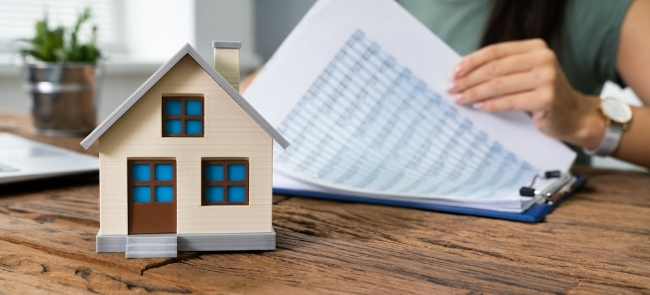
So, you are considering renting out a property for the first time. The reasons might be various – moving to a new location, struggling to sell the property or holding on to it as an investment. Whether you ended up in this situation through choice or through necessity, you need to take account of a number of factors.
In this post, we’ve gathered the essential steps that you need to undertake before letting out your house and feel more or less confident at the beginning of your landlord journey.
If you:
- Are a first-time landlord;
- Don’t know what to expect when renting out;
- Are searching for truly practical letting tips,
Then read on. This guide with tips for renting out a house won’t disappoint you!
If you are looking to become an HMO landlord, you should know that they come with more requirements than a standard single let. For more information, check our article on what is HMO.
Permission to let your property
Before you even place your house on the market, ask yourself, “Do I have legal rights to rent my home?”.
There are two conditions that you should pay attention to:
- The legal ownership of the house – As a “freeholder”, you don’t require any permission to let your property. However, if you have a leasehold property, then you need to check your lease to see if you are entitled to sub-let the property;
- The type of mortgage you have – If you took out a mortgage for your property, you need to contact your mortgage lender beforehand. Residential mortgages usually require a Consent to Let that is granted for a short-term period of 12 months. However, you should be aware that your mortgage lender can refuse you permission. If you plan to let your property for a longer period, then you might convert your residential mortgage to buy-to-let. In this case, you might face rearrangement fees and changes in the rates of the mortgage. Either way, you need to contact your mortgage lender.
Looking for more advice for first-time landlords? Our dedicated collection of helpful articles has everything you need to know!
The costs of being a landlord
As a first-time landlord, there are a lot of costs that you never really know about before doing the research. While the cost of running a property business varies depending on location, there are a number of items you’ll need to consider when calculating how much it will cost to be a landlord.
Main costs
- Energy Performance Certificate (EPC) – This is one of the legal requirements that every landlord should obtain. For landlords’ relief, this document needs renewal only every 10 years and doesn’t cost a lot. However, you should remember that the Energy Efficiency rating for private landlords shouldn’t be below E. With that being said, you might want to improve the energy efficiency of your home before obtaining the certificate.
- Gas Safety Certificate – Unlike EPC, Gas Safety Certificate should be renewed every year. If you install a new appliance, for example, a boiler, you might need to consider whether you need a gas safety certificate for a new boiler or any other appliance.
- Electrical Installation Condition Report (EICR) – Recently, the government obliged landlords to perform Electrical Installation checks, to make sure that all the electrical fittings meet the standards. The certificate should be renewed at least every 5 years. For good or bad, it is applicable only for England.
- Smoke/carbon monoxide alarms – Landlords in England must install smoke alarms in a property, where solid fuel is used.
- Income Tax – You do have to pay income tax when renting out your house. The income tax for basic rate tax-payers is 20%, whereas the higher rate tax-payers will pay 40%. Keep in mind that you don’t pay tax for the first £1,000 of income you make from letting your property.
- Landlord Licence – The problem with licensing is that it’s applicable only to properties located in the selective licencing areas. To see if you need to apply for the landlord licence, consult with your local council. If your property is located in London, you might find the London Property Licensing website quite useful.
- Rental property maintenance and repairs – Long story short, repairs are unpredictable. It is hard to estimate which appliance will cause problems or what your tenants will break next. Even if you can deduct the costs from a security deposit, it might not be enough to cover the whole repair expense. This brings us to…
- Savings – One thing that you should remember – no matter how much you try to predict the expenses, there are always unforeseen costs. Whenever you make a profit, put aside the earnings. That way you will have a backup for the unpredicted repairs or changes.
Occasional costs
- Landlord Insurance – You are not obliged to get landlord insurance, however, it is something that you should seriously consider purchasing. It’s not a mandatory requirement to rent out a house, but it’s peace of mind worth paying for.
- Letting agent fees – Letting agency is a great solution if you don’t want to deal with the landlord routine like collecting the rent, managing the deposit or advertising. However, they come at a cost. Usually, the fee varies between 10% and 15% of the rental income.
- Mortgage interest – It really varies from case to case. If you have taken a loan to purchase a property, then you should definitely factor in your interest rate.
- Empty Period – You shouldn’t also deny the possibility of your house staying empty. Especially, if during this period you need to redecorate your property or cover other running costs.
- Utility Bills – Normally, tenants are responsible for utilities. However, if you prefer to take responsibility for the bills, then it will affect your expenses and you should include them in the rent.
- Furniture storage – Storage for landlords is again a very individual thing. Some might prefer to free up the property from personal belongings but not have enough space to store them elsewhere.
Depending on the circumstances, the list of expenses might not end here. We know that it might seem overwhelming, however, once you get a grip of the expenses, the managing gets easier.
As you’re renting out a property for the first time, you will have to prepare to spend more money on preparing for letting out, however, this is mostly related to you just starting out.
Do keep in mind, you’ll more than likely have to put up some money in order to deal with repairs. This also includes cases of fair wear and tear where it would be unreasonable to expect your tenant to pay for them.
How much to charge
Let’s be honest – everything else takes a back seat when we think of how much money our properties can generate. And it’s perfectly understandable – the more you earn, the faster you will be able to cover the expenses associated with the property, and eventually get paid for the time and effort put into renting. However, there is one important thing to remember – don’t get emotional.
It’s quite common among landlords to overprice their properties. They simply put a price on the time and effort that it took them to bring the property into rentable conditions.
However, that way you risk missing on tenants. So, set the sentimental value aside and adapt to the current rates on the market.
Check what prices other landlords demand for properties similar to yours. The information is readily available online on websites like Rightmove, Zoopla or even Facebook Marketplace. Compare the properties by size, location, furnishing and decoration conditions. As an alternative, you can request a professional estimate from a letting agency – some of them provide the assessment without additional fees.
Prepare your property for renting
Once you’ve researched the market, you probably have an idea of how you should improve your property before letting it. If you haven’t thought about it yet, here’s a hint:
Tenants don’t like extravagant or old “fit-for-the-purpose” decorations. Keep it simple and clean.
The furnishing will depend on the type of tenants you wish to attract. For example, students will most likely search for a fully furnished apartment. Whereas families will probably give their preferences to a property with a minimum furnishing. You might want to include white goods in your rental property. Also, remove your personal belongings or any items of sentimental value, otherwise, you risk having them damaged.
It’s also important to make sure that the property looks immaculate. It’s essential to deep clean the property before you put it on the market. The same applies to structural repairs – that way you will not only speed up the tenants’ search but show that you are a responsible landlord. Once you are done, don’t forget to snap detailed and good-quality pictures (alternatively, you can arrange a professional property photography session).
In a podcast session, we recently had with Tonya and Rea from The Property Twins we delved into the topic of ensuring that whenever you’re renting your property, you make sure it’s in pristine condition. That way you show tenants that you care about the property. It’s sort of a subconscious trick successful landlords use to reduce the wear and tear of a property.
Furthermore, fixing even the smallest problems that occur will easily extend the life of the rental and ensure that your tenants remain for a long time to come, thus maximising your return on investment.
Not to mention that this will definitely increase the chances of you getting the property rented out quickly.
Also, the keys. Don’t forget the keys. While you are preparing your house to let, a good idea will be to cut a couple of key copies. You will have to have a set for yourself and a set or two for your tenants.
And last but not least, before the tenancy beginnings, create an inventory list of everything that you own. This way you will avoid unnecessary disputes over broken items in your house.
Landlord responsibilities
Before you start renting your property, you need to check if a potential tenant has the right to rent. This includes the immigration status of all the adults living on your property and the validity of their documents.
Once you find the tenants that you are happy to rent your property to, you have to provide them with the following pack of documents:
- Tenancy Agreement and relevant contact details;
- Deposit Protection Scheme details;
- Gas Safety certificate and EPC;
- Electrical Installation Condition Report (England only);
- “How to rent” guide;
- Copy of inventory report (if applicable).
Safety and security
The safety of tenants falls into the list of new obligations that you will be entitled to once you officially become a landlord. Gas Safety checks and Electrical Installation checks are only some of many others.
To start with, the property should be fit for human habitation. This means that the building should be in good condition, damp-free and with proper ventilation. You also need to improve the internal arrangement of the property. The layout shouldn’t pose any danger to tenants.
Moreover, the rental should have a stable supply of hot and cold water and systems for disposal of the used water. A heating source is a must, however, it is up to you to decide what to install – it might be electric radiators or a boiler-operated heating system. To make things easy for you, we offer landlord boiler cover plans to help you keep your heating system in its best condition.
Feeling overwhelmed by the responsibilities?
Let Fantastic Services help you with this upcoming challenge! Whether it is deep cleaning or repairs work, we are happy to provide you with reputable workers. Fantastic Services is proud to say that we are able to serve you in more than 100 different ways. Cleaning, gardening, property maintenance, appliance repair, pest control, antiviral sanitisation – you name it!
And, with our Fantastic Club membership, you will be able to get preferential member rates and exclusive deals. Don’t waste any more time scrolling through the web in search of the right solution, it’s already here! Book your consultation, today.
Need help?
Find a professional to take care of your rental property.

Takeaways
- You can not rent your property without legal rights to do that.
- Even if you rent out only a house or an apartment, it is still considered a business and requires financial investment.
- Renting is taxable.
- Before setting the rent price, examine the current market.
- Leave a good impression by fully cleaning and maintaining your property.
- Remember, the landlord status comes with a lot of legal responsibilities.
***
Did you find this article helpful? Let us know in the comments down below!
Image Source: Depositphotos / AndreyPopov

